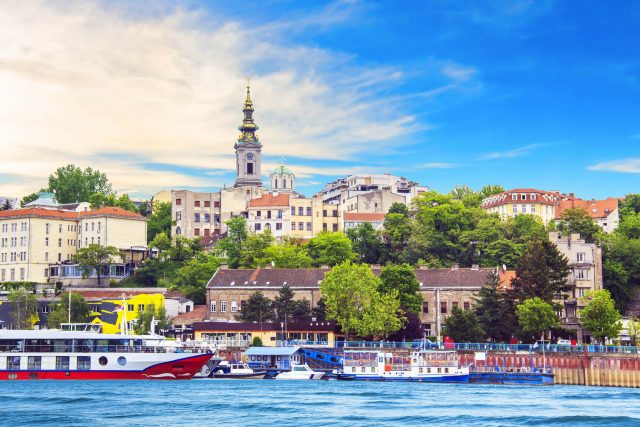
European Diary: Belgrade, April 2024
In 2022, I was in Serbia’s capital, Belgrade, for the first time, as I have described here before. On 22 April 2024 I was returning to this fair city, where the photograph above shows the old quarter seen from the Sava River. I had been asked to give a talk about the ‘Evolving Role of Government’ at the Faculty of Economics in the University of Belgrade. I said that a clear description of the role of government could be derived from Christ’s parable of the Good Samaritan. A man on his way from Jerusalem to Jericho was assaulted by robbers, and as he lay helpless by the road, a priest and a Levite passed by, doing nothing. A Samaritan however took the man with him, bought him new clothes and paid for his food and accommodation at a country inn. The four lessons of this parable were, I submitted: 1) Government is necessary to defend us against robbers hiding out in the mountains. 2) The Samaritan was a man of means. He could afford to help the victim of the assault. 3) The Samaritan did good at his own expense, not that of others. This was voluntary, not enforced, charity, and indeed it may be doubted that enforced charity is charity at all. 4) The two intellectuals in the parable, the priest and the Levite, did not feel an obligation to help the victim.
Two Public Goods
Thus, the original and indispensable role of government is to protect the citizens against violence which could come from abroad as well as from robbers up in the mountains. In other words, government must provide defence and law enforcement. These are, as economists say, ‘public goods’. But in my talk I pointed out a crucial difference between them. Defence is a good which tends to be effective only if produced on a large scale, by either large states or alliances of small states. It is almost useless if produced on a small scale, for example by a small nation. It was easy for the Soviet Union to occupy and annex the three Baltic states in 1940. It was also easy for Nazi Germany in the same year to occupy Denmark, Norway, the Netherlands, Belgium, and Luxembourg. Law enforcement is on the other hand a public good which can, and should, be produced at a local level. The subsidiarity principle, that decisions should be made as close as possible to those whom they affect, and by them, applies.
I define myself as a conservative liberal who supports private property, free trade, limited government, and respect for traditions. Is there any country which corresponds to those ideals? Or is it just a pie in the sky? In response I pointed in my talk to four countries. Great Britain in the nineteenth century practised free trade to the great benefit of her citizens. The United States in late nineteenth century practised free trade within her immense boundaries, although not with other countries. But she was nevertheless a land of freedom and opportunity for the 26 million people who immigrated between 1865 and 1914. Hong Kong after the Second World War escaped from poverty in a few decades, with one of the freest economies in the world, and in 1997 when she was forcibly returned to China, against the wishes of the inhabitants, her GDP per capita was 35 times that of China. Nowadays, Switzerland is perhaps the best example of a successful country, not only because she is free and prosperous, but also because she has developed institutions which allow people of different languages and religions to live together peacefully under one law.
The Paradox of the Welfare State
I reminded my audience in Belgrade of St. Thomas Aquinas’ observation: Man is a sinner, whereas the law should only try to suppress sins harmful to others, such as murder and theft, leaving other sins alone, while certainly recognising them as sins. At present, this would mean that victimless crimes like selling videos of oneself online and smoking pot should not be pursued by the police. I added that I did not hate government on principle like some American libertarians. The state is not only the indispensable provider of defence, law enforcement and other public goods, but also the institutional expression of our will to be a separate community, share a fate, protect a common heritage, preserve certain values. The state is, as Edmund Burke observed, not built on a contract of those who happen to be here and now, but rather on a partnership of past, present and unborn generations about time-tested principles, conventions and institutions. It was however a paradox, I said, that in modern times the redistributive state had rapidly grown, although the possible need for any redistribution had been greatly reduced with the virtual elimination of poverty, improved health, and the vastly increased opportunities of people to better their conditions. Indeed, government was now sometimes the problem rather than the solution.



 Subscribe
Subscribe